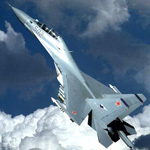NATO, Russian jets hold first ever joint exercise

NATO and Russian fighter jets held their first ever joint exercise Tuesday, teaming up in a bid to prevent attacks such as the September 11, 2001 strikes on the United States, a NATO official confirmed. “Today was an important step for NATO-Russia relations, and therefore in my opinion, also an important step for the world because the threat of terrorism is a common one,” Georges D’hollander, general manager of the NATO Consultation, Command and Control Agency told reporters in Warsaw Tuesday after the first of two planned exercises were completed.
“This is a confidence-building initiative which originated by the decision of the NATO-Russia Council,” D’hollander added, at once stressing its “important political dimension.”
The unprecedented exercise began Tuesday morning with the departure of a Polish CASA 295M aircraft from Krakow simulating a hijacked civilian aircraft. Two Polish F-16s from the Krzesiny air base near Poznan, central Poland, later intercepted the “renegade” aircraft and then handed the mission over to two Russian Sukhoi jets that guided the plane to the northern Polish city of Malbork.
“This was the first time in history when there was co-operation between Russian and NATO fighters in this kind of a scenario,” NATO exercise director Czech Colonel Petr Mikulenka told reporters in Warsaw.
The aircraft were taking part in the four-day NATO-Russia “Vigilant Skies 2011,” event that began Monday involving flights over Poland and the Black Sea.
On Wednesday, three Turkish F-16s and two Russian Sukhois will intercept a rogue plane over the Black Sea.
“The aerial exercises are to test the NATO-Russia Council Cooperative Airspace Initiative (CAI), aimed at preventing a new 9/11 by “sharing information on movements in NATO airspace and Russian airspace, and by coordinating interceptions of renegade aircraft,” according to a NATO statement.
The initiative hopes to “improve air safety for the thousands of passengers using international flights between NATO airspace and Russian airspace each day, and the millions of inhabitants on the ground.”
The new airspace security system “provides a shared NATO-Russia radar picture of air traffic and allows early warning of suspicious air activities through commonly agreed procedures.”
“In situations when an aircraft starts behaving erratically, the air traffic coordination system offers increased information sharing and communication to ensure rapid, joint responses to terrorist threats,” a NATO statement said.
The system has two coordination centres, one in Warsaw and another in Moscow, with local coordination sites in Russian cities of Kaliningrad, Rostov-on-Don and Murmansk as well as Warsaw, Bodo in Norway and Ankara in Turkey.